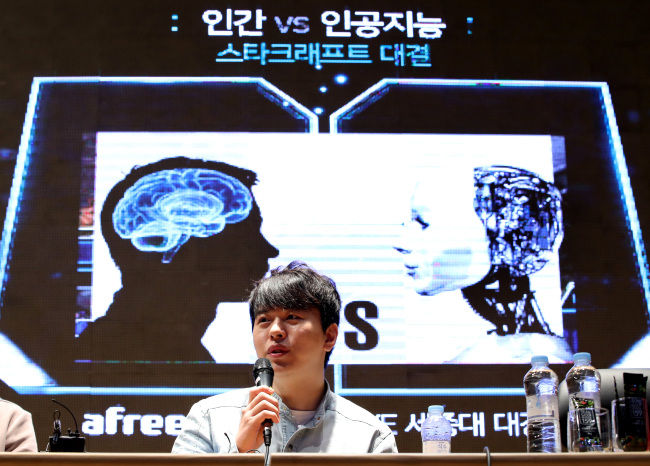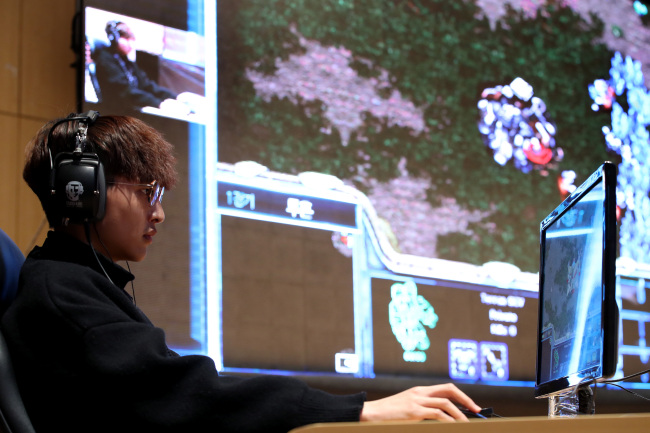Humans still ahead of AI, at least in StarCraft
Pro-gamer Song Byung-gu beats AI 4:0 in StarCraft contest in Korea
By Sohn Ji-youngPublished : Nov. 1, 2017 - 15:20
In the latest face-off between humans and artificial intelligence, a South Korean professional gamer beat his AI opponents 4:0 in the PC strategy game StarCraft during a competition held Tuesday at Sejong University in Seoul.
Though the AI computers managed to beat two amateur players, the bots all lost against professional gamer Song Byung-gu, who is known as one of the best Starcraft players in the world.
Three human players -- two student players and Song -- each competed against four AI bots trained in Starcraft including MJ Bot from Korea’s Sejong University, ZZZK from Australia, TSCMOO from Norway and CherryPi created by Facebook.
Though the AI computers managed to beat two amateur players, the bots all lost against professional gamer Song Byung-gu, who is known as one of the best Starcraft players in the world.
Three human players -- two student players and Song -- each competed against four AI bots trained in Starcraft including MJ Bot from Korea’s Sejong University, ZZZK from Australia, TSCMOO from Norway and CherryPi created by Facebook.

It was highly anticipated that these AIs would lose to a pro-gamer, considering the limitations of their training algorithms and the complex and spontaneous nature of StarCraft that makes it hard for computers to anticipate their opponents’ moves.
Unlike Google DeepMind’s famed AI AlphaGo -- which mastered the ancient Chinese game of Go using complex machine learning algorithms and massive data -- the four AIs competing in StarCraft were trained to follow a “script” that simply commands a computer to perform certain actions in specified situations.
“There were clear limitations to an AI not trained via machine learning,” said Kim Kyung-joong, a professor of computer engineering at Sejong University who led the development of the MJ Bot.
Deep learning is a form of high-level machine learning that uses artificial neural networks -- layers of interconnected nodes -- that rearrange themselves as new information comes in, allowing computers to self-learn effectively without the need for human programming.
This method enabled AlphaGo to evaluate, develop and execute its strategies to a top-notch level that enabled the AI defeat Go grandmaster Lee Se-dol in a high-profile match held last year.
Even without machine learning mechanisms in place, the four AIs in the Seoul competition did display some level of superiority in StarCraft, particularly when competing against amateur players.
For example, the AI bots recorded a peak count of 20,000 actions per minute -- which measures how fast a player is controlling the units — during the matches. Human pro-gamers on average record only around 300 actions per minute.

Nonetheless, the AI bots showed critical shortcomings in their ability to strategize and control their moves in response to the changing battle strategies executed by the human pro-gamer.
“Though it did feel like the AIs were playing like a human at times, I felt they have yet to learn the nuanced control and judgment of human players,” Song said after his 4:0 victory.
“If a pro-gamer participates in training these AIs, I think they could vastly improve. Once AIs become more skilled, I think they could become good practice partners to human pro-gamers in the future,” he said.
Looking ahead, a more anticipated human versus AI battle is slated to happen in the future for Starcraft II, as DeepMind is working to build an AI that can master the game. The US firm has yet to reveal how close it may be to reaching this breakthrough.
By Sohn Ji-young (jys@heraldcorp.com)








![[Graphic News] More Koreans say they plan long-distance trips this year](http://res.heraldm.com/phpwas/restmb_idxmake.php?idx=644&simg=/content/image/2024/04/17/20240417050828_0.gif&u=)
![[KH Explains] Hyundai's full hybrid edge to pay off amid slow transition to pure EVs](http://res.heraldm.com/phpwas/restmb_idxmake.php?idx=644&simg=/content/image/2024/04/18/20240418050645_0.jpg&u=20240419100350)







![[KH Explains] Hyundai's full hybrid edge to pay off amid slow transition to pure EVs](http://res.heraldm.com/phpwas/restmb_idxmake.php?idx=652&simg=/content/image/2024/04/18/20240418050645_0.jpg&u=20240419100350)

![[Today’s K-pop] Illit drops debut single remix](http://res.heraldm.com/phpwas/restmb_idxmake.php?idx=642&simg=/content/image/2024/04/19/20240419050612_0.jpg&u=)